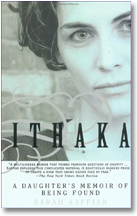Books |
ITHAKA: A Daughter’s Memoir of Being Found
Sarah Saffian
By
Published: Jan 01, 2005
Category:
Memoir
She went to the gym early. Came home to change. Was about to go to work when the phone rang.
"Is Sarah Saffian there?"
"This is Sarah."
"My name is Hannah Morgan. I think I’m your birth mother."
Which was quite a shock to the 23-year-old New Yorker. She knew she had been adopted at birth. But the family that had been hers all her life couldn’t have been more loving and nurturing — Sarah wasn’t one of those adoptees who went to bed every night wondering who she really was. She had always felt more wanted than abandoned.
So her initial reaction was….confusion. "I’d had my family heritage whisked out from under me, like in the old magic trick, only I wasn’t left intact as the place setting is supposed to be after the tablecloth has been whisked away."
That call is, not, she realizes, a one-time communication. These people — a New Hampshire potter and her husband — want to be in her life, to have a relationship with her. And just to make that clear, they send letters to Sarah a few days later. "We have always thought about you and longed for you," Hannah writes. "You are a stranger, and yet you are so familiar." Adam, her father, tells her that reaching out for her now feels like "the best thing for you." He says he loves her very much. "I regret I haven’t been telling you I love you every day of her life."
If you have any sensitivity to human feelings, these letters will rip you up. They certainly knock Sarah back on her heels. "I long to know you, but I don’t know where to put you," she writes Hannah and Adam. "I need some time."
ITHAKA is two stories. One is Sarah’s, and it’s about starting to deal with a new reality after two decades of a harmonious life. The other, told in letters, is the story of Hannah and Adam: their romance, the pregnancy, their decision to give their child up, their eventual marriage, and the life they’ve made together.
Both stories are intimate in the extreme — this is a memoir, not a case study. We track Sarah’s relationship with her father and her boyfriend, and see what she shares, and with whom. It’s easy to know what to feel in that story. The story of the birth parents is far trickier. They are her parents; they have a right to their feelings. But Hannah and Adam are endlessly intrusive, and their letters made me feel — and sometimes made Sarah feel — that they were hunting their daughter down.
What makes it even trickier is that this is a love story. The birth parents want to meet, complete the circle, express their love. And why not? But Sarah is just not ready: "Hannah was so kind, and I was so afraid, and my fear of this kind person made me sad" — it’s the rare writer who can pack so much into a single sentence.
Pictures arrive. Sarah sees herself in her parents. She goes to a meeting of adoptees; others weep, but her eyes remain dry. Time passes — two years. Her parents have written often; she’s replied just seven times. Maybe, she thinks, she had no desire to find her birth parents. She feels "removed, impassive."
But you know a story like this is driving toward convergence — or, at the very least, confrontation. I won’t spoil that part of the book for you. Let’s just say that nothing is as it seems. And that the world is at once more magical and banal than we may like to think.
Emotion junkies, parents who have given kids up for adoption, men and women who have adopted children and, of course, adopted children will take to this book like catnip. Me, I would have loved it more had it been 50 pages shorter — but I think that about almost every book. The key fact is, though I come from a standard-issue nuclear family, ITHAKA pressed every button. I laughed. I cried. And, mostly, I felt I understood where every character was coming from — and I admired the way they dealt with feelings so powerful that they blow right past words.
To buy ITHAKA from Amazon.com, click, click here.


